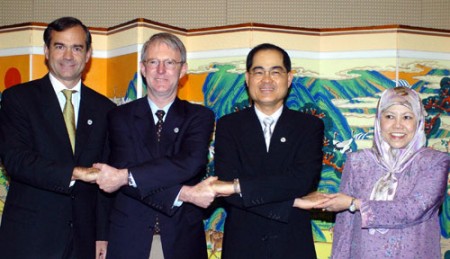http://www.inthesetimes.com/working/entry/5704/pacific_trade_talks_open_will_obama_pursue_promised_new_approach/Wednesday March 17 5:33 pm

Chile's Foreign Minister Ignacio Walker, New Zealand's Trade Minister Jim Sutton, Singapore's Trade and Industry Minister Lim Hng Kiang and Brunei Princess Hajah Masna join hands in South Korean on June 2, 2005, six months before a trans-Pacific free-trade agreement between their four countries came into force. (Photo by KIM JAE-HWAN/AFP/Getty Images)
By David Moberg
As President Obama prepares for his trip to Asia next week, his administration�s trade negotiators are busy in Australia this week in the first round of talks about a new Trans-Pacific Partnership Trade Agreement (TPA).
Although the idea originated in the Bush administration, labor officials and other progressive critics of past trade deals see the TPA talks as a test of whether Obama will develop a new model for such agreements, as he promised on the campaign trail.
�This is a great opportunity for the administration to show how they�re going to reform trade policy or whether they�ll continue with the past policies,� says AFL-CIO deputy chief of staff Thea Lee, a longtime trade policy expert. �It�s not clear at this point what they will do. But there�s a high level of anxiety.� Public Citizen�s Global Trade Watch Director Lori Wallach struck the same note: �As a candidate Obama committed to specific trade policy reforms. This is where the rubber hits the road. We�ll se if we get a new model of trade as Obama promised or revert back to the Bush model following NAFTA.�
Fair trade advocates have reasons to worry. Obama already has backed off promises to re-negotiate parts of NAFTA and has urged Congress to approve Bush-negotiated trade agreements with South Korea, Panama and Colombia, an egregious violator of worker rights. And when Rep. Michael Michaud (D-ME), chair of the House Trade Working Group, asked U.S. trade representative Ron Kirk (a longtime supporter of NAFTA and similar trade deals) a series of questions about how TPP would protect worker rights and good jobs, �We did not get any clear answers or commitments from him on any of these,� he said.
TPP talks involve four countries with which the U.S. already has bilateral trade agreements�Chile, Peru, Australia and Singapore, as well as New Zealand, Brunei and Vietnam. They grew out of a four-way trade deal��the Pacific Four,� including Singapore, Chile, Brunei and New Zealand.
Many analysts see the TPP talks as a way for the U.S. to be included in and heavily influence any broad new Asian trade agreement, implicitly challenging intra-Asian agreements such as the recent China-ASEAN (southeast Asian) trade deal that might be dominated by China and Japan. From that perspective, TPP is just a preliminary to the U.S. trying to open talks involving all of the 21 nations in the Asian-Pacific Economic Cooperation. �The idea of the Obama administration is to use this
as the framework for an APEC-wide trade agreement,� says AFL-CIO global economic policy analyst Jeff Vogt.
FULL story at link.
